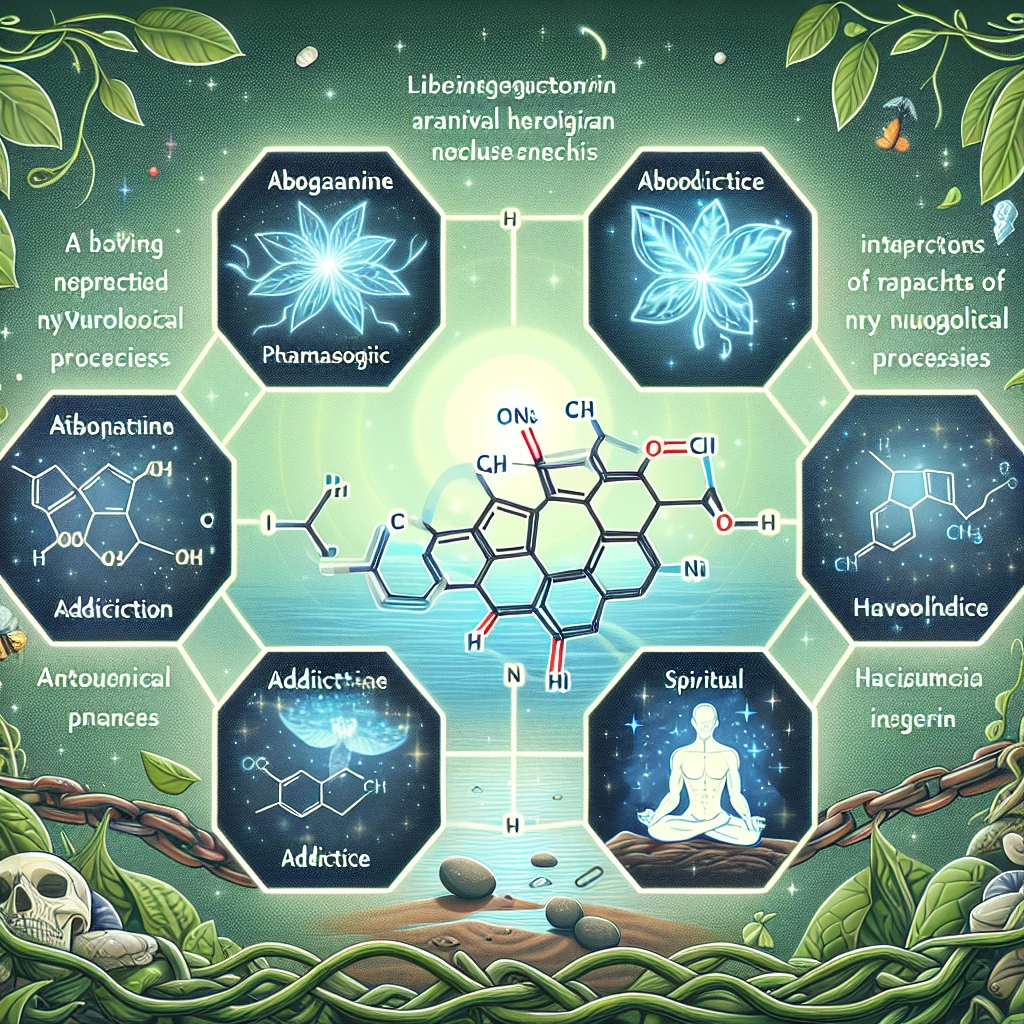
- Published on
- Authors

- Name
- ric de yuga 😄
🌿 Ibogaine: Pharmacological Profile, Anti-Addiction Properties, and Spiritual Impact
Ibogaine, a naturally occurring psychoactive substance derived from the root bark of the African shrub Tabernanthe iboga, has gained attention for its unique ability to combat addiction and its profound spiritual effects. This blog post explores the pharmacological makeup of ibogaine, its use in addiction treatment, and its spiritual impact.
🔬 Pharmacological Profile of Ibogaine
Ibogaine is classified as an indole alkaloid and interacts with multiple neurotransmitter systems in the brain. Its complex pharmacological profile underpins its potential therapeutic benefits.
Mechanism of Action:
- NMDA Receptor Antagonism: Ibogaine acts as an antagonist at NMDA receptors, which are involved in neural plasticity and cognitive functions. This interaction may contribute to its neuroprotective effects.
- Serotonin Reuptake Inhibition: Ibogaine inhibits the reuptake of serotonin, increasing its availability in the synaptic cleft, which can enhance mood and alleviate depressive symptoms.
- Dopamine Modulation: Ibogaine affects dopamine levels by interacting with dopamine transporters and receptors, potentially reducing cravings and withdrawal symptoms associated with addiction.
- Sigma-2 Receptor Interaction: The interaction with sigma-2 receptors is believed to play a role in ibogaine’s anti-addictive properties.
🌟 Anti-Addiction Properties
Ibogaine has shown promise in treating various forms of addiction, including opioid, alcohol, and cocaine dependencies. Its multifaceted action on the brain's neurochemistry helps interrupt the cycle of addiction.
Therapeutic Effects:
- Opioid Withdrawal Mitigation: Ibogaine is particularly noted for its ability to alleviate the symptoms of opioid withdrawal, often referred to as "resetting" the brain's addiction pathways.
- Craving Reduction: By modulating dopamine and serotonin levels, ibogaine helps reduce the intense cravings that typically drive relapse.
- Long-Term Efficacy: Unlike traditional addiction treatments, a single session of ibogaine can provide sustained relief from addiction, often for months, reducing the need for continuous medication.
🌿 Spiritual Impact
Beyond its pharmacological effects, ibogaine is known for inducing intense, introspective experiences that many describe as spiritual or transformative.
Spiritual and Psychological Insights:
- Deep Introspection: Ibogaine often leads to a profound state of introspection, allowing individuals to confront and process past traumas and emotional pain.
- Spiritual Awakening: Many users report experiencing a sense of spiritual awakening or connection, gaining new perspectives on their life and behavior.
- Emotional Healing: The therapeutic journey facilitated by ibogaine can result in significant emotional healing, fostering a sense of inner peace and acceptance.
🧠 Current Research and Clinical Applications
The use of ibogaine in addiction treatment is supported by a growing body of anecdotal evidence and scientific research, though it remains controversial and is not widely approved due to safety concerns and regulatory hurdles.
- Clinical Studies: Limited clinical studies have demonstrated the efficacy of ibogaine in reducing addiction symptoms and promoting long-term recovery.
- Safety and Regulation: Ibogaine is classified as a Schedule I substance in many countries, including the United States, due to concerns about its safety profile. However, some countries, such as Brazil and Mexico, have clinics that legally administer ibogaine under medical supervision.
🌍 Integrating Traditional Wisdom and Modern Science
Ibogaine has been used for centuries in traditional Bwiti ceremonies in Central Africa, where it is considered a sacred medicine. Integrating this traditional knowledge with modern scientific research can provide a holistic approach to addiction treatment.
🔮 Conclusion: The Future of Ibogaine in Addiction Treatment
Ibogaine represents a promising, albeit controversial, tool in the fight against addiction. Its unique ability to address both the neurochemical and psychological aspects of addiction makes it a powerful candidate for further research and clinical application.
As we continue to explore the potential of ibogaine, it is essential to balance scientific rigor with respect for traditional practices. By doing so, we can unlock new pathways to healing and recovery for individuals struggling with addiction.
In the quest to overcome addiction, ibogaine offers a beacon of hope, illuminating the path to a healthier, more fulfilling life. 🌿💊🧠
Disclaimer: The information presented in this blog post is for educational purposes only and does not constitute medical advice. Ibogaine is a controlled substance in many jurisdictions, and its use should be guided by legal and medical professionals.
